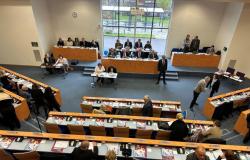What are the common points between the Greater Nancy Metropolis and the community of communes of the Pompey Basin? To tell the truth, they are numerous, first of all because of their common history, whether industrial, mining, political or cultural. Indeed, the two territories share the same employment, mobility and living area. Thus, and to best stick to the daily realities of residents who, for many, share the same living area, the Greater Nancy Metropolis and the community of communes of the Pompey Basin took note, during the metropolitan council of Thursday, November 28, of the signing of a local reciprocity contract with the aim of promoting cooperation between the two territories for the next five years.
“Residents don't care about administrative boundaries,” underlines Pierre Boileau, metropolitan vice-president responsible for relations with neighboring territories. A point widely shared by the assembly which, unanimously, welcomed the realization of this territorial collaboration. “Many issues are accelerating and collective intelligence must lead us to offer the most appropriate responses,” commented Laurent Trogrlic, president of the community of communes of the Pompey Basin, who was exceptionally present for the occasion.
Strengthen existing cooperation
A “desire to work together” which has already been illustrated by the establishment of the Multipole Sud Lorraine, bringing together 13 intercommunalities of more than 560,000 inhabitants, the creation of a new territorial coherence plan (SCoT) in common for the period 2021-2030, the creation of the Lorr'up economic development agency or the mixed economy company (SEM) Energies, “two [derniers] examples for which the Metropolis has provided significant funds, notably bringing investors such as Caisse des Dépôts, Crédit Agricole and others,” recalls the elected official.
After an initial diagnosis, carried out by the SCALE agency, 5 areas of cooperation were defined: economic development; mobility; natural resources; adaptation to climate change; future cooperation (particularly in terms of sports, tourist and cultural facilities). This reciprocity contract must therefore allow co-signatories to justify departmental, regional, national or European co-financing for the implementation of projects of common interest linked to these themes. Expect more that “financial efficiency will lead us to work more and more in this way”, notes Pierre Boileau, referring to the current context of budgetary austerity.
Several tracks
In detail, several avenues are already being studied, such as the creation of an Innovation-Training campus, in partnership with the University of Lorraine, which will complement the existing offer in Greater Nancy and neighboring areas; support the development of companies in the health sector, in connection with the rise of the IHU, among which the Pompey Basin has several flagships (MS Techniques, Transluminal, Axplora, Startorius and even SD Innovation); the development of river freight, the joint management of the Hague forest, a true green lung of the territory, the development of partnerships through the ARCHYPEL project, etc.
In order to continue in this logic, the president of Greater Nancy, Mathieu Klein, affirms that “other contracts are being considered”, and Vincent Materont, metropolitan vice-president responsible for finance, adds that “our Vosges friends are calling us with their feet too.” To be continued.






